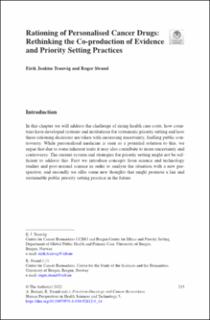| dc.contributor.author | Tranvåg, Eirik Joakim | |
| dc.contributor.author | Strand, Roger | |
| dc.date.accessioned | 2022-04-01T07:10:25Z | |
| dc.date.available | 2022-04-01T07:10:25Z | |
| dc.date.created | 2022-03-31T09:51:23Z | |
| dc.date.issued | 2022 | |
| dc.identifier.isbn | 978-3-030-92611-3 | |
| dc.identifier.uri | https://hdl.handle.net/11250/2989004 | |
| dc.description.abstract | Rising health care costs is a challenge for all health care systems, and new and expensive cancer drugs is an important contributor to this. Many countries – like Norway – have therefore established priority setting institutions and systems for drug appraisals where equal treatment, neutrality and transparency are key values. Despite this, controversy surrounding drug reimbursement decisions are persistent.
The development of personalised cancer medicine is seen by many as a potential solution to difficult priority setting decisions, by tailoring the right drug to the right patient at the right time. We, however, see personalised oncology and medicine in general not only as a solution, but also as a potential contributor high costs and to persisting controversy. We will argue that attempts to improve and strengthen the priority setting system – without accepting that a wider perspective on science and society is required – is likely to fuel even more controversy.
In contrast, our suggestion takes a different approach building on post-normal science. From a co-production perspective, scientific, technological and societal developments are causally entangled into each other. Alongside refining priority setting principles, one can and ought to raise normative questions about the trajectory of personalised cancer medicine and of how to create a well-functioning public sphere. How can we imagine a well-functioning system of technological development and health care priority setting? Which changes in research policy and funding could support such a system? And which properties could biomarkers have in order to help society manage the health gap? | en_US |
| dc.language.iso | eng | en_US |
| dc.publisher | Springer | en_US |
| dc.relation.ispartof | Precision Oncology and Cancer Biomarkers. Issues at Stake and Matters of Concern | |
| dc.rights | Navngivelse 4.0 Internasjonal | * |
| dc.rights.uri | http://creativecommons.org/licenses/by/4.0/deed.no | * |
| dc.title | Rationing of Personalised Cancer Drugs: Rethinking the Co-production of Evidence and Priority Setting Practices | en_US |
| dc.type | Chapter | en_US |
| dc.description.version | publishedVersion | en_US |
| dc.rights.holder | Copyright 2022 The Author(s) | en_US |
| cristin.ispublished | true | |
| cristin.fulltext | original | |
| cristin.qualitycode | 1 | |
| dc.identifier.doi | https://doi.org/10.1007/978-3-030-92612-0_14 | |
| dc.identifier.cristin | 2014033 | |
| dc.source.pagenumber | 235-250 | en_US |
| dc.identifier.citation | In: Bremer, A., Strand, R. (eds) Precision Oncology and Cancer Biomarkers. Human Perspectives in Health Sciences and Technology, vol 5. p. 235-250 | en_US |

